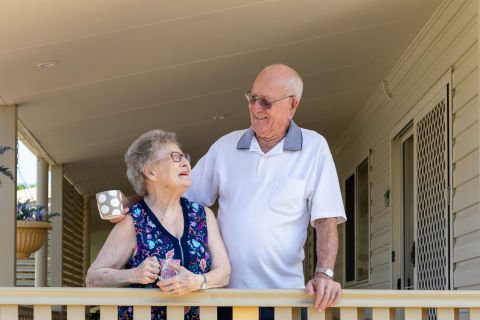Families, money, and giving while living
To boost their retirement income, more and more Australians are accessing the equity held in their homes.
Sponsored Story

Key points
- The Bank of Mum and Dad is the ninth largest bank in Australia (maybe larger)
- There are more reasons (and expectations) for parents to financially help adult children
- How do parents find the funds to help children without sacrificing their own retirement?
The Bank of Mum and Dad has received a lot of attention recently, partly because of the unaffordability of housing stock for first home buyers and partly due to rapid increases in mortgage interest rates.
As the ninth largest lender in Australia, this form of intergenerational wealth transfer has a massive influence on the ability of younger people to purchase property, finish tertiary education, and sometimes to find a roof over their heads in the rental market.
But what effect does this have on a nation of retirees who are hardly living the high life on Age Pension entitlements or low super balances?
Size of the Bank of Mum and Dad
The Bank of Mum and Dad is valued at the ninth largest bank in Australia, based upon known loans, according to Digital Finance Analytics (2021). It is possibly even larger in 2024 given the squeeze in the property market and higher cost of living.
How long does it take new homeowners to save to buy a house?
Domain’s latest First-Home Buyer Report, found that the average time for an Australian couple aged 25-34 to save the 20% deposit required for an entry-priced house is now four years and nine months. That’s the average – in Sydney it’s a hefty six years and eight months. Other estimates from comparison site, Finder, suggest a 12-year saving period for a deposit on a first home.
The price of a home compared to salary
According to financial journalist, Alan Kohler, the ratio of median salary to house price when he purchased in the 1980s was about 3.5. Fast forward to August 2023 and it was 7.4.
How many adult kids are ‘boomerangs’?
The Household Income and Labour Dynamics in Australia Survey (2023) survey of 17,000 Australians shows the proportion of ‘boomerang’ adult kids living with older parents is 54.3% for men (aged 18-29) and 46.7% for women of the same age. These percentages have increased by 7.7% for males and 10.8% for females.
Typical reasons to lend money to adult children
- To purchase a property
- To pay for education
- Medical needs
- Relationship stress (divorce or family violence)
- General financial stress
- To help with expenses for grandchildren.
How do retirees get the funds to be a Bank of Mum and Dad?
Not every retiree is in the position of making a loan or gift. It’s unlikely those on a full Age Pension will have a lot of spare cash to give money to adult children. But anecdotally, it seems that older Australians are prepared to access superannuation lump sums and household loans in order to help out.
The uptake in the government Home Equity Access Scheme rose by 60% over a 12-month period according to the Department of Social Services. Household loans are also on the increase.
Pros
- Most parents want more for their children than they had themselves
- Giving them help to be better educated or make a deposit on a property can be seen as giving them a good start in life
- Many parents are happy with the concept of ‘giving while living’ as opposed to leaving money in a will.
Cons
- Things can get messy if adult children and their partners go their separate ways (documenting loans and gifts is a sound practice)
- It could be argued that giving money does not build resilience or independence
- It may be unclear if you are sharing a gift or if it’s a loan that needs to be repaid
- Age Pension recipients may run afoul of Centrelink’s ‘gifting’ provisions.
How do retirees maintain a dignified or reasonable lifestyle while their money is funding
adult kids?
Independent Retirement expert, Kaye Fallick, says: “No one is as acutely aware of the value of owning your own home as an Australian retiree.
“It offers security, a more cost-effective form of accommodation, ongoing community engagement, and a source of funding, if and when needed. So, it is hardly surprising that retirees will reach into their own pockets, no matter how modest their retirement, to help their adult kids to get a foot on a rung of the property ladder.
“This is family love being shared, in the most practical of ways.”
Homeowners can, of course, consider accessing the wealth in their houses as a way to give while living. A household loan is often more suited to covering some of the major components of long-term retirement (refinancing, renovating, funding aged care) as well as giving to children and grandchildren as the Bank of Mum and Dad.
For more information:
Download the free e-guide 6 Ways to Use Your Home Equity.
Or use Household Capital’s Home Equity Calculator to calculate the equity in your home.
Prefer to speak to a real person?
Speak with one of Household Capital’s retirement specialists for a 15-minute no-obligation call on 1300 699 624. Or book a time that suits you to ask questions and discuss your needs. Schedule a call.
Disclaimer: Applications for credit are subject to eligibility and lending criteria. Fees and charges are payable, and terms and conditions apply (available upon request). Household Capital Pty Limited ACN 618 068 214, Australian Credit Licence 545906, is the Servicer for the credit provider Household Capital Services Pty Limited ACN 625 860 764.
National Seniors’ disclaimer: This content includes sponsored advertising which helps fund our important advocacy work. Please note that the information provided and opinions expressed in this advertising material are solely those of the advertiser. We encourage you to carefully evaluate and consider any advertised offering before making a purchase. Any transactions or interactions between you and the advertiser are solely between you and the advertiser.







